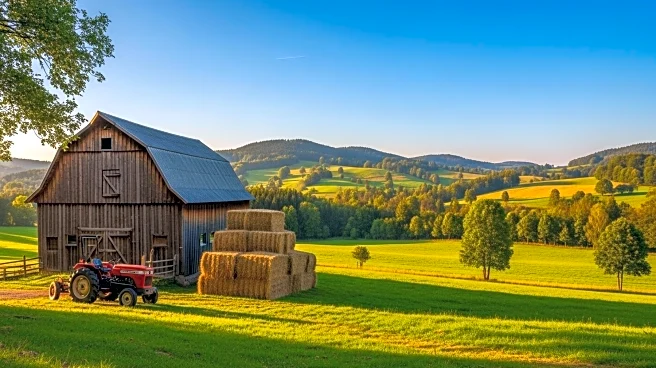What's Happening?
The United States Department of Agriculture (USDA) has released information emphasizing the significance of small farms in the U.S. food system and rural economy. According to Faith Parum, an economist at the American Farm Bureau Federation, small farms are defined by the USDA as operations earning less than $350,000 in gross cash farm income annually. Despite high expenses often exceeding $200,000, these farms typically net around $45,000 each year. The USDA distinguishes between 'small farms' based on income and 'family farms' based on ownership structure, with 86% of U.S. farms classified as small and 97% as family-owned. These farms play a crucial role in supporting local economies by providing jobs, generating revenue, and sustaining essential services like schools and hospitals.
Why It's Important?
Small farms are vital to the sustainability of rural communities across the United States. They not only contribute to food production but also bolster local economies by creating employment opportunities and supporting local businesses. The presence of small farms helps maintain the infrastructure necessary for community life, such as schools and healthcare facilities. This economic activity is essential for keeping rural areas vibrant and livable, preserving traditions, and ensuring the continuity of the nation's food supply. The impact of small farms extends beyond their economic contributions, as they play a key role in maintaining the cultural and social fabric of rural America.
What's Next?
The continued support and recognition of small farms by institutions like the USDA are crucial for their survival and growth. As these farms face challenges such as rising costs and market competition, policies that provide financial assistance, access to resources, and educational opportunities can help sustain their operations. Stakeholders, including policymakers and community leaders, may focus on initiatives that enhance the viability of small farms, ensuring they remain integral to the rural economy and community life. Future developments may include increased investment in infrastructure and technology to improve farm efficiency and profitability.
Beyond the Headlines
The role of small farms in rural communities also touches on ethical and cultural dimensions. These farms often embody sustainable practices and contribute to biodiversity, which is increasingly important in the face of environmental challenges. Additionally, small farms help preserve rural traditions and lifestyles, offering a counterbalance to urbanization and industrial agriculture. Their existence raises questions about food security, land use, and the preservation of rural heritage, highlighting the need for thoughtful policy-making that considers long-term impacts on society and the environment.









